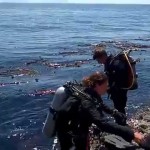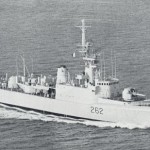 Mathieu Powell.
Mathieu Powell.
Writing Impacts.
It felt really strange the first time. My gear was awkward and heavy. I was stiff and constrained. I couldn’t bend and I had to struggle to get my fins on. When I was finally ready, I walked into the ocean. The cold water took my breath away. I had second thoughts about proceeding. Hell, I was having my twenty-second thought! Eventually though, the layer of water next to my skin under the 7mm of neoprene suit warmed up and I felt a little more comfortable.
After a final look around, I stepped off the large, submerged slab of stone – one of many in the Ogden Point breakwater – and I ducked below the water. As soon as I started breathing easily, I forgot about how claustrophobic the mask was making me feel. The weight of my equipment vanished, I floated into an alien world I’d never before experienced and it was exhilarating! I felt like Superman flying above an exotic landscape filled with eerie plants and strange denizens.
Ogden Point Breakwater has three sections – the furthest out being the deepest and most exposed to Juan de Fuca Strait’s waves and currents. As a beginner, I started in the middle section where I found ling cod, rock fish, nudibranchs, a spiny crab and a huge array of anemones. Some of the divers told me they found a den of wolf eels and an octopus.
Vancouver Island and surround is actually one of the best places to scuba dive in the world; a veritable garden paradise awaiting discovery. In fact, Jacques Cousteau considered BC’s coastlines to be the best cold-water diving area in the world. Diving is better during the winter when there is greater visibility. In the summer, algae blooms can cloud the water and limit your vision.
I entered into this community of divers with trepidation because I have an embarrassing fear of deep water, but overcoming that fear still remains one of my personal triumphs which led to some of the best adventures I’ve experienced.
I quickly met some good friends who shared their insights and passion for the sport. One was a recently retired gentleman named Michael Harvey who had just completed 342 dives!
“That many cold water dives is probably equivalent to about 1,000 dives in the warm water,” Michael joked. “I always tell people to try it in the tropics. You have so much less equipment and you don’t even need a suit.”
While children have to be twelve to begin diving instruction, there’s no age limit at the other end of the continuum. Health, not age, is the determining factor.
“I’m the oldest I know at 65,” Michael told me. “But the oldest diver I’ve heard about is an 84 year old woman who dives Barkley Sound!”
Two other new friends were a husband and wife who dived together; Carole Balkenier-Pope and Ian Pope. She could really relate to my fear of water. If someone had asked her what she wanted to do when she grew up, scuba diving would not have been on her list. “I was petrified of water,” she told me. “But I always thought it was so fascinating to see underwater stuff.” She joined Aquatics Anonymous (for scared-y-cat adults) and worked her way from simply getting up the nerve to put her face in the water all the way to instructor. Today she takes beautiful underwater photographs of local flora and fauna, which she turns into stunning cards and calendars for sale across the island. I bought three pictures from her and they still adorn my walls.
Ian was a member of the Artificial Reef Society. The society cleans and strips decommissioned ships, then sinks them to create a home for sea creatures. It doesn’t take long for life to cover and fill their new home, making ships, once cold and grey, resplendent with vibrant colours and fascinating critters. “I always tell the Navy their ships look better on the bottom than on the surface,” he chuckled. His descriptions of artificial reefs intrigued me, so my brothers and I, along with a few friends chartered a boat to Snake Island just off Nanaimo. Nearby, there are two scuttled Canadian destroyers; the HMCS Saskatchewan and HMCS Cape Breton.
 We chose to dive the HMCS Saskatchewan because she provided us with a variety of diving options. She’s just over 350 feet long and lies on a sloping bottom. Most of the dive is in the 80 to 100 foot range and requires a medium to advanced level of training. Even though diving is a safe sport, you have to know what you’re doing and keep your wits about you. Several people have died attempting to explore this ship.
We chose to dive the HMCS Saskatchewan because she provided us with a variety of diving options. She’s just over 350 feet long and lies on a sloping bottom. Most of the dive is in the 80 to 100 foot range and requires a medium to advanced level of training. Even though diving is a safe sport, you have to know what you’re doing and keep your wits about you. Several people have died attempting to explore this ship.
We broke into two groups and travelled down the buoy lines. The water was a murky green, but quite clear. It was surreal watching the other group travel down their buoy line about 30 feet away from ours, their bubbles rising languidly to the surface as their flashlight beams played down into the darkness. The bow of the great battleship loomed suddenly out of the dark waters. It was extremely intimidating. When we settled onto the ship’s deck, I found myself looking down the barrels of two large cannons, which, like the rest of the ship was absolutely swarming with all kinds of marine invertebrate life and various species of fish.
There were large clusters of glossy white plumose anemones. The perfect nurseries for juvenile fish. So much sea life so coated the ship it was difficult to see her outlines. Large lingcod and cabazon swam in and out of portals. I poked my flashlight into one and I couldn’t see far for the swarms of fish. At that depth, we had only enough air to stick around for ten minutes and still have enough air for the journey to the surface. Even though I couldn’t stay long, it was certainly worth the trip.
Divers’ reasons for jumping in are as varied as the people involved. Many get hooked on the surrealism of this otherworldly pursuit. Others to become photographers or to challenge themselves with the technical training. Me? I joined because I just wanted to fly like Superman.
Whatever your reason, Vancouver Island is a fabulous place for the sport.
Mathieu Powell is Vancouver Island Now’s representative for marketing and advertising for the Great Victoria area. For more about advertising opportunities with Vancouver Island Now, click here.
